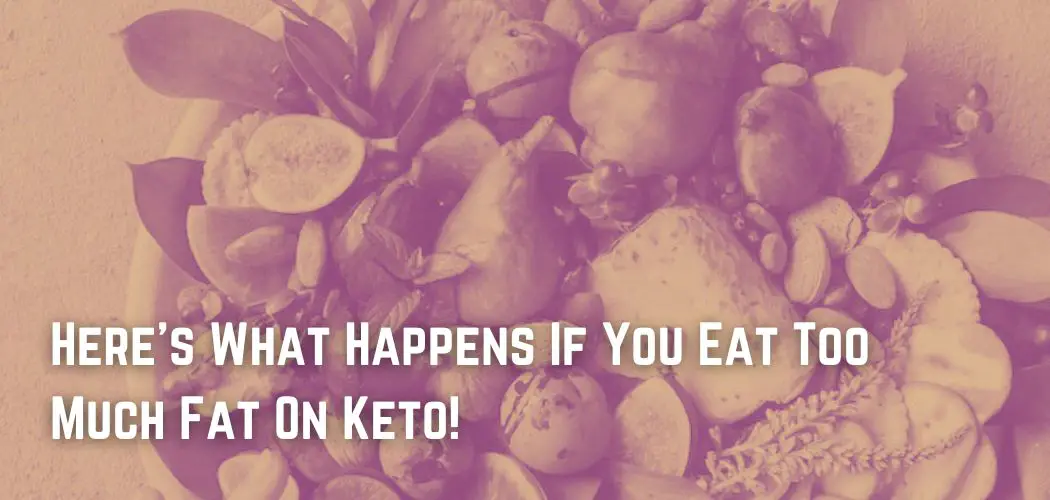The ketogenic diet, or keto diet, is a high-fat, low-carbohydrate diet that has gained popularity for its potential weight loss and health benefits.
While consuming healthy fats is an essential part of a keto diet, it’s possible to consume too much fat, which can have negative effects on the body.
Here are some potential consequences of eating too much fat on a keto diet:
- Slow Weight Loss: While consuming healthy fats is important for maintaining a state of ketosis, consuming too much fat can cause weight loss to stall or even reverse. Excess fat intake can lead to an excess of calories, which can hinder weight loss efforts.
- Digestive Issues: Consuming too much fat can lead to digestive problems such as diarrhea, constipation, and bloating. This is because high-fat foods take longer to digest than other foods, and can be harder for the body to break down.
- Increased Risk of Heart Disease: While a moderate amount of healthy fats can have positive effects on heart health, consuming too much saturated and trans fats can increase the risk of heart disease. It’s important to choose healthy sources of fats, such as avocados, nuts, seeds, olive oil, and fatty fish.
- Increased Risk of Nutrient Deficiencies: Consuming too much fat can lead to a decrease in the consumption of other important nutrients, such as fiber, vitamins, and minerals. This can lead to nutrient deficiencies and other health problems.
- Increased Risk of Gallstones: Consuming a diet high in fat can increase the risk of developing gallstones. This is because excess cholesterol in the bile can lead to the formation of gallstones.
It’s important to remember that the ideal amount of fat intake on a keto diet will vary from person to person, depending on factors such as age, gender, weight, activity level, and overall health goals.
As a general guideline, most people on a keto diet aim to consume between 70-80% of their calories from fat.
However, it’s important to choose healthy sources of fat and avoid consuming excessive amounts of saturated and trans fats. Additionally, incorporating a variety of nutrient-dense foods into your diet can help prevent nutrient deficiencies.

Consuming too much fat on a keto diet can have negative effects on weight loss, digestive health, heart health, and nutrient status.
It’s important to aim for a moderate and healthy amount of fat intake and to choose nutrient-dense sources of fats.
It’s also important to consult with a healthcare professional or registered dietitian before starting a new diet or making significant changes to your dietary habits.
What’s Too Much Fat In Keto Diet?
The amount of fat you need to consume on a ketogenic diet varies depending on your individual needs and goals, such as your activity level, body composition, and overall health.
In general, on a ketogenic diet, you’ll want to consume enough fat to keep you feeling satiated and provide you with energy, while still allowing your body to burn fat for fuel. Typically, people aim to get about 70-80% of their daily calories from fat.

However, it’s important to keep in mind that not all fats are created equal. You’ll want to focus on consuming healthy sources of fat, such as avocado, nuts and seeds, olive oil, coconut oil, fatty fish, and grass-fed meats.
You should avoid or limit unhealthy sources of fat, such as trans fats, hydrogenated oils, and highly processed foods.
Healthiest Way To Follow A Keto Diet Plan
The healthiest way to follow a ketogenic diet is to focus on nutrient-dense whole foods and to make sure you are meeting your nutritional needs. Here are some tips:
- Choose healthy fats: Focus on consuming healthy sources of fat such as avocados, nuts and seeds, olive oil, coconut oil, fatty fish, and grass-fed meats. Avoid or limit unhealthy sources of fat such as trans fats, hydrogenated oils, and highly processed foods.
- Eat plenty of vegetables: Low-carb vegetables such as leafy greens, broccoli, cauliflower, and asparagus should make up a large portion of your meals. They are low in carbs, high in fiber, and packed with vitamins and minerals.
- Don’t skimp on protein: Protein is important for building and repairing tissues in the body. Make sure to consume adequate amounts of protein from sources such as meat, poultry, fish, eggs, and plant-based sources such as nuts, seeds, and tofu.
- Stay hydrated: Drinking enough water is important for overall health and can help prevent dehydration, which is common on a ketogenic diet due to the diuretic effect of carbohydrate restriction.
- Consider supplementing: It can be challenging to get all the necessary nutrients on a ketogenic diet, so consider supplementing with a multivitamin or specific nutrients such as magnesium and potassium.
- Don’t restrict calories too much: While a calorie deficit is necessary for weight loss, it’s important not to restrict calories too much. Aim to create a moderate calorie deficit and listen to your body’s hunger and fullness signals.
- Focus on long-term sustainability: Remember that a ketogenic diet should be sustainable in the long-term. It’s important to find a way of eating that works for you and that you can maintain over time. Consider seeking guidance from a registered dietitian to ensure you are meeting your nutritional needs while following a ketogenic diet.
Conclusion
The ketogenic diet can be a healthy and effective way to manage weight, improve blood sugar control, and reduce inflammation.
However, it’s important to follow the diet in a healthy and sustainable way, focusing on nutrient-dense whole foods, healthy fats, adequate protein, hydration, and meeting nutritional needs.
The best approach is to work with a healthcare professional or registered dietitian to create an individualized plan that fits your goals and lifestyle. Remember that any dietary change should be done gradually and with care to ensure long-term success and overall health.

